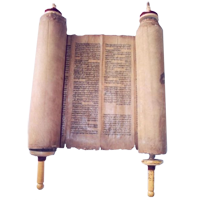- Montreal, Canada
- don@saintesecritures.org

Chapter 14 3 But thy providence, O Father, governeth it: for thou hast made a way in the sea, and a safe path in the waves;4 Shewing that thou canst save from all danger: yea, though a man went to sea without art.5 Nevertheless thou wouldest not that the works of thy wisdom should be idle, and therefore do men commit their lives to a small piece of wood, and passing the rough sea in a weak vessel are saved.6 For in the old time also, when the proud giants perished, the hope of the world governed by thy hand escaped in a weak vessel, and left to all ages a seed of generation.7 For blessed is the wood whereby righteousness cometh.8 But that which is made with hands is cursed, as well it, as he that made it: he, because he made it; and it, because, being corruptible, it was called god.9 For the ungodly and his ungodliness are both alike hateful unto God.10 For that which is made shall be punished together with him that made it.11 Therefore even upon the idols of the Gentiles shall there be a visitation: because in the creature of God they are become an abomination, and stumblingblocks to the souls of men, and a snare to the feet of the unwise.12 For the devising of idols was the beginning of spiritual fornication, and the invention of them the corruption of life.13 For neither were they from the beginning, neither shall they be for ever.14 For by the vain glory of men they entered into the world, and therefore shall they come shortly to an end.15 For a father afflicted with untimely mourning, when he hath made an image of his child soon taken away, now honoured him as a god, which was then a dead man, and delivered to those that were under him ceremonies and sacrifices.16 Thus in process of time an ungodly custom grown strong was kept as a law, and graven images were worshipped by the commandments of kings.17 Whom men could not honour in presence, because they dwelt far off, they took the counterfeit of his visage from far, and made an express image of a king whom they honoured, to the end that by this their forwardness they might flatter him that was absent, as if he were present.18 Also the singular diligence of the artificer did help to set forward the ignorant to more superstition.19 For he, peradventure willing to please one in authority, forced all his skill to make the resemblance of the best fashion.20 And so the multitude, allured by the grace of the work, took him now for a god, which a little before was but honoured.21 And this was an occasion to deceive the world: for men, serving either calamity or tyranny, did ascribe unto stones and stocks the incommunicable name.22 Moreover this was not enough for them, that they erred in the knowledge of God; but whereas they lived in the great war of ignorance, those so great plagues called they peace.23 For whilst they slew their children in sacrifices, or used secret ceremonies, or made revellings of strange rites;24 They kept neither lives nor marriages any longer undefiled: but either one slew another traiterously, or grieved him by adultery.25 So that there reigned in all men without exception blood, manslaughter, theft, and dissimulation, corruption, unfaithfulness, tumults, perjury,26 Disquieting of good men, forgetfulness of good turns, defiling of souls, changing of kind, disorder in marriages, adultery, and shameless uncleanness.27 For the worshipping of idols not to be named is the beginning, the cause, and the end, of all evil.





